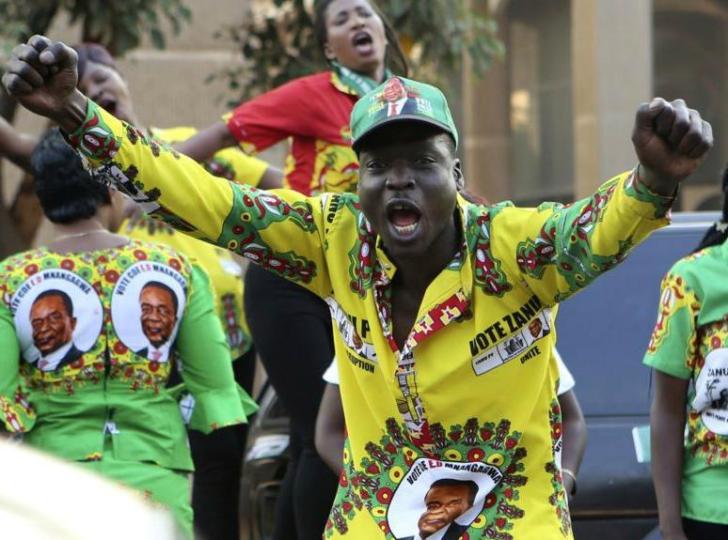News / National
Zanu-PF at its weakest since 2008
11 Sep 2024 at 11:02hrs |
0 Views

The Zimbabwe Democracy Institute (ZDI) reports that Zanu-PF may be at its most vulnerable point since the 2008 general elections, largely due to factional infighting and skepticism about President Emmerson Mnangagwa's commitment to stepping down in 2028 as promised.
Mnangagwa has declared his intention to leave office in 2028, but there is growing concern among observers and critics that some of his loyalists are actively pushing for him to extend his rule until 2030. This internal division within Zanu-PF has created two main factions: one advocating for an extension of Mnangagwa's presidency and the other urging him to adhere to his constitutional term limit.
The ZDI report, titled "Entering the Foggy Zone: Transition and Succession," highlights the current factional struggle within the party. Vice-President Constantino Chiwenga has publicly opposed the glorification of individual party leaders, emphasizing respect for national institutions and values over personal aggrandizement. This discord is seen as indicative of Zanu-PF's weakening position.
According to the ZDI report, the fragmentation within Zanu-PF is reminiscent of the situation in 2008, when the party faced significant electoral challenges and internal disunity. "Elite disunity over succession issues suggests that Zanu-PF is at its most precarious since 2008, especially after the 2023 elections, which were widely criticized by SADC, the AU, and the EU for manipulation," the report states.
The research draws parallels with historical transitions from authoritarian regimes, citing O'Donnell and Schmitter's analysis of elite defections and internal splits as critical factors in such transitions. "The current political environment in Zimbabwe, marked by significant factionalism, mirrors the conditions that often lead to democratization, where internal rifts between hard-liners and reformers play a key role," the report notes.
The report further notes that despite its weakened state, Zanu-PF continues to suppress opposition to maintain control. "Disunity alone is unlikely to lead to the collapse of authoritarian rule. Political elites typically resist relinquishing power, especially when facing credible opposition threats," it explains.
Zanu-PF's strategy has included suppressing the opposition, exemplified by the destruction of the opposition Citizens Coalition for Change (CCC) and the controversial recalls of elected MPs. Sengezo Tshabangu, a self-proclaimed CCC secretary-general, has played a role in weakening the opposition, further consolidating Zanu-PF's hold on power.
The report concludes that Zimbabwe's political landscape remains dominated by Zanu-PF's control, with the military playing a decisive role in party and state succession. "The military has historically been a pivotal force in Zimbabwe's political transitions, and it remains a key player in determining Mnangagwa's successor," the ZDI report asserts.
Mnangagwa has declared his intention to leave office in 2028, but there is growing concern among observers and critics that some of his loyalists are actively pushing for him to extend his rule until 2030. This internal division within Zanu-PF has created two main factions: one advocating for an extension of Mnangagwa's presidency and the other urging him to adhere to his constitutional term limit.
The ZDI report, titled "Entering the Foggy Zone: Transition and Succession," highlights the current factional struggle within the party. Vice-President Constantino Chiwenga has publicly opposed the glorification of individual party leaders, emphasizing respect for national institutions and values over personal aggrandizement. This discord is seen as indicative of Zanu-PF's weakening position.
According to the ZDI report, the fragmentation within Zanu-PF is reminiscent of the situation in 2008, when the party faced significant electoral challenges and internal disunity. "Elite disunity over succession issues suggests that Zanu-PF is at its most precarious since 2008, especially after the 2023 elections, which were widely criticized by SADC, the AU, and the EU for manipulation," the report states.
The report further notes that despite its weakened state, Zanu-PF continues to suppress opposition to maintain control. "Disunity alone is unlikely to lead to the collapse of authoritarian rule. Political elites typically resist relinquishing power, especially when facing credible opposition threats," it explains.
Zanu-PF's strategy has included suppressing the opposition, exemplified by the destruction of the opposition Citizens Coalition for Change (CCC) and the controversial recalls of elected MPs. Sengezo Tshabangu, a self-proclaimed CCC secretary-general, has played a role in weakening the opposition, further consolidating Zanu-PF's hold on power.
The report concludes that Zimbabwe's political landscape remains dominated by Zanu-PF's control, with the military playing a decisive role in party and state succession. "The military has historically been a pivotal force in Zimbabwe's political transitions, and it remains a key player in determining Mnangagwa's successor," the ZDI report asserts.
Source - newshawks
Join the discussion
Loading comments…


































